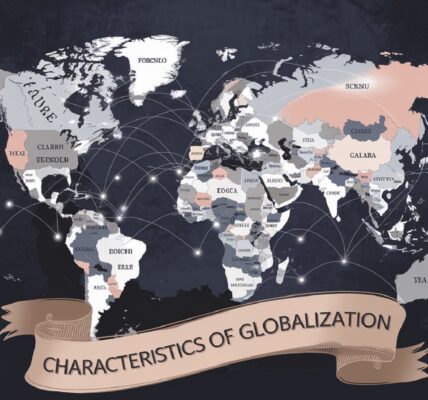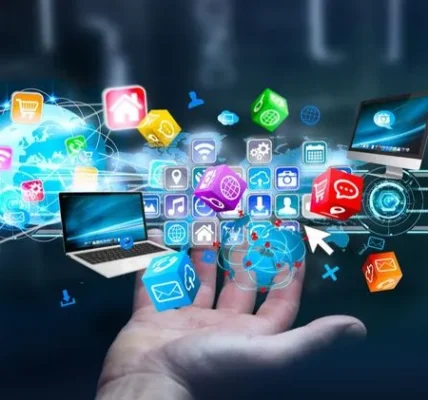Technology is a constant in everyday life in modern society, so omnipresent that we often overlook its presence and the impact it has on our lives. From the smartphone that wakes us up in the morning to the satellites orbiting the Earth, technology forms the fabric of our daily reality. But what exactly is technology? This article dives into the heart of this question, exploring the definition, evolution, types, and impact of technology on contemporary society.
Technology, at its core, is the application of scientific knowledge to solve problems and facilitate tasks in daily life. This definition covers an astonishingly broad spectrum, from the invention of stone tools in prehistory to today’s advances in artificial intelligence and robotics. Technology is not just a set of tools or devices; it is a dynamic process of innovation and adaptation that has driven human development throughout history.
The impact of technology on society is profound and multifaceted, affecting every aspect of human life. It has transformed the way we communicate, work, learn, and entertain ourselves. Technology has improved the quality of life in countless ways, but it also presents significant ethical challenges and dilemmas. This article will explore these issues, offering a comprehensive view of what technology means in today’s world.
Definition of Technology
Technology is defined as the set of knowledge, skills, techniques, and processes used in the creation of goods or services or in the pursuit of goals, such as scientific research. This definition, while broad, underscores the essence of technology as a tool to extend human capabilities and overcome natural limitations. From the simple stone tools created by early humans to the complex artificial intelligence systems of today, technology has always been a reflection of human ingenuity and innovation.
Origins and Evolution
The history of technology is as old as humanity itself. The first technological artifacts, such as hand axes and spears, allowed our ancestors to improve their efficiency in hunting and gathering, marking the beginning of a long path of technological development. The invention of the wheel, writing and later, the steam engine, are milestones that demonstrate how technology has been a key driver in the evolution of society.
Presence in the Modern Age
In the modern era, technology has advanced at an unprecedented pace, especially in the field of information and communication. Digitalization and connectivity have revolutionized the way we interact, work, and think. Information technology has transcended physical barriers, creating an interconnected world where information is accessible instantly and anywhere.
Impact on Daily Life
Technology affects virtually every aspect of daily life. It has improved efficiency in work, education and health, and provided new forms of entertainment and communication. However, it also poses challenges, such as issues of privacy, cybersecurity and the digital divide, which refers to the disparity in access to information technologies between different regions and socioeconomic groups.
History of Technology
The history of technology is a fascinating chronicle of human ingenuity and its relentless pursuit of improving the quality of life through tools and innovations. From the rudimentary stone artifacts of the Stone Age to the sophisticated artificial intelligence networks of today, each era has witnessed technological discoveries and advancements that have shaped the course of human history.
The Neolithic Revolution: The Dawn of Technology
The Neolithic Revolution, which occurred about 10,000 years ago, marked one of humanity’s first and most significant technological leaps. The domestication of plants and animals, along with the development of agricultural tools, transformed nomadic hunter-gatherer societies into sedentary agricultural communities. This change not only altered the social and economic structure of these societies, but also laid the groundwork for the development of early civilizations.
Antiquity and the Middle Ages: Fundamental Innovations
In ancient times, civilizations such as the Mesopotamian, Egyptian, Greek, and Roman contributed significant technological advances, including the wheel, writing systems, monumental architecture, and irrigation systems. During the Middle Ages, technologies such as Gutenberg’s printing press and the magnetic compass not only facilitated the dissemination of knowledge and geographical exploration, but also laid the groundwork for the Renaissance and the Age of Discovery.
The Industrial Revolution: A Paradigm Shift
The Industrial Revolution, which began in the 18th century, marked another crucial milestone in the history of technology. The invention of the steam engine and the mechanization of production radically transformed industries and society, shifting the economic axis from agriculture to manufacturing and ushering in the industrial era.
The Information Age: The Digital Revolution
The 20th century and the dawn of the 21st century have witnessed the digital revolution, marked by the development of the personal computer, the Internet and mobile technology. This era has redefined the way we live, work and interact, making information the most valuable resource and radically transforming all aspects of society.
Types of Technology
Technology can be classified into several categories, each with its own characteristics, applications, and impacts on society. This diversity reflects the breadth and depth of human innovation in the search for solutions to complex problems and improvements in quality of life. Below, we will explore some of the main types of technology that have shaped and continue to transform our world.
Information Technology (IT)
Information Technology encompasses the computer and telecommunications systems used to store, retrieve, transmit and manipulate data. IT has revolutionized the way people and businesses communicate, access information and conduct transactions, making it a cornerstone of the global economy and everyday life.
Biotechnology
Biotechnology applies scientific principles and techniques to living organisms or their components to develop innovative products and processes. This technology has significant applications in areas such as medicine, agriculture and energy production. Biotechnology offers solutions to problems such as disease, food safety and environmental sustainability.
Nanotechnology
Nanotechnology involves the manipulation of materials at the atomic and molecular level, opening up new possibilities in fields such as medicine, electronics and materials. Its ability to create materials with unique properties promises to revolutionize numerous industries and improve existing products, from stronger fabrics to more effective medical devices.
Green Technology
Green Technology focuses on developing sustainable solutions that reduce environmental impact and promote efficient use of resources. It includes renewable energy, sustainable building technologies and clean production practices. Green technology plays a crucial role in combating climate change and protecting the environment.
Space Technology
Space technology encompasses technologies developed for the exploration and use of outer space, including satellites, rockets and space stations. This technology has also provided vital tools for Earth observation, global communications and scientific research.
Impact on Society
The impact of technology on society is profound, spanning all aspects of human life, from how we communicate to how we work, learn and entertain ourselves. Technology has been a transformative force, driving social, economic and cultural change. However, these advances also pose significant challenges that require careful reflection and responsible management.
Transformation of Communication
Technology has revolutionized communication, removing barriers of time and space. Social media and email have created new forms of social interaction, allowing people to connect, share, and collaborate. This ubiquitous connectivity has transformed personal relationships, politics, and culture, fostering a more interconnected and, at times, more polarized world.
Changes in Work and the Economy
Automation and digitalisation have transformed the labour landscape, creating new opportunities and challenges. Technology has created entirely new economic sectors and changed the nature of many jobs, increasing efficiency and productivity. However, it has also caused disruptions in traditional industries and raised questions about job security, skills gaps and economic inequality.
Advances in Education
Technology has had a significant impact on education, democratising access to knowledge and personalising learning. Digital tools and online resources have expanded educational opportunities, allowing students to access quality education. However, the digital divide remains a challenge, highlighting the need to ensure equitable access to educational technology.
Innovations in Health
Technology has driven revolutionary advances in medicine, improving diagnosis, treatment and prevention of disease. Telemedicine, biotechnology and medical devices have improved quality and life expectancy. As a result, they raise ethical and access issues, especially in resource-limited regions.
Challenges and Ethical Considerations
Despite its many benefits, technology poses significant ethical and social challenges. Issues such as privacy, data security, artificial intelligence and its impact on employment, and the digital divide require public debate and carefully considered policies. Only in this way will we ensure that the benefits of technology are accessible to all and do not harm society.
Technology and Education
The integration of technology into education has transformed the learning landscape, offering new opportunities and methods for teaching and learning. This digital revolution has not only changed the way educators deliver knowledge. It has also redefined the educational experience for students, allowing them to access a vast amount of resources and tailor their learning to their individual needs.
Personalization of Learning
One of the greatest advantages of technology in education, without a doubt, is its ability to personalize learning. On the one hand, digital educational platforms and, on the other, online resources, provide the opportunity for students to learn at their own pace. In addition, these tools allow study materials to be tailored to their specific learning styles and needs. Consequently, this has resulted in a more inclusive and accessible learning experience, in which students can explore their interests and, simultaneously, strengthen their skills with greater freedom.
Expanded Access to Education
Technology has indeed democratized access to education, removing a wide range of barriers, both geographical and economic, that have traditionally restricted educational opportunities. Through the use of online courses, MOOCs (Massive Open Online Courses) and various educational platforms, it is possible for people from all over the world to access quality education. This ranges from basic lessons to advanced university programs, which, in many cases, are available for free or at a significantly reduced cost.
Innovative Tools for Teaching
Technological tools have enriched teaching methods, allowing educators to incorporate interactive media, virtual reality, and simulations into their lessons. These tools not only make learning more engaging, but also facilitate a deeper understanding of complex concepts, especially in fields such as science, technology, engineering, and mathematics (STEM).
Challenges and Considerations
While technology offers numerous opportunities in the field of education, it also presents challenges. The digital divide, which refers to the disparity in access to technology between different socioeconomic groups and regions, is a significant problem. Furthermore, over-reliance on technology can affect social and communication skills and raises concerns about data security and student privacy.
Preparing for the Future
Integrating technology into education not only enhances current learning, but also prepares students for the future. By becoming familiar with digital tools and developing skills in key areas such as computer science and problem-solving, students will be better equipped to navigate an increasingly technological world and contribute to society in meaningful ways.
Challenges and Ethical Considerations
The rapid evolution of technology brings with it a spectrum of challenges and ethical considerations that impact society at multiple levels. These ethical dilemmas require deep reflection and ongoing dialogue between developers, users, policymakers and society at large to ensure that technology is developed and used responsibly and sustainably.
Privacy and Data Security
In the digital age, data privacy and security have become paramount concerns. The mass collection and analysis of personal data by companies and governments raises serious questions about the right to privacy and consent. The increasing incidence of cyberattacks and security breaches also underscores the need for robust data protection measures and ethical practices in handling personal information.
Impact on Employment
Automation and artificial intelligence are transforming the employment landscape, replacing some jobs while creating others. This transition poses significant challenges, such as the need for retraining and continuing education for the workforce. In addition, the ethical question of how to ensure a fair transition for those whose jobs are affected by automation arises.
Digital Divide
The digital divide describes the notable disparity in access to information and communication technologies that exists between different socioeconomic groups. This gap not only deepens pre-existing inequalities, but also significantly restricts opportunities for those who lack adequate access to technology. Addressing this digital divide is therefore crucial to ensure that the benefits derived from technology are truly inclusive and equitable for all.
Ethical Considerations in Artificial Intelligence
Artificial intelligence raises complex ethical questions about the autonomy, responsibility, and rights of machines. As AIs become more advanced, questions arise about how to ensure their decisions are fair, transparent, and aligned with human values. In addition, the possibility of developing AI with consciousness raises profound philosophical and ethical questions about the nature of intelligence and consciousness.
Environmental Sustainability
Technology production and disposal have a significant impact on the environment. Resource extraction, energy consumption, and e-waste generation pose challenges to environmental sustainability. Promoting sustainable technological practices, such as device recycling and the development of green technologies, is essential to minimizing the environmental impact of technology.
The Future of Technology
To look to the future of technology is to embark on a journey of limitless possibilities. Emerging trends and developing innovations promise to further transform our society, economy, and personal lives. However, embracing these future advancements requires not only optimism and curiosity, but also careful consideration of the ethical, social, and environmental implications they carry.
Artificial Intelligence and Automation
Artificial intelligence (AI) will continue to be a significant area of innovation, with increasingly sophisticated systems capable of performing complex tasks from autonomous driving to medical diagnosis. The integration of AI into everyday life raises questions about human-machine interaction, privacy, and employment, challenging society to adapt to these new realities.
Augmented and Virtual Reality
Augmented reality (AR) and virtual reality (VR) are redefining human experiences, from entertainment to education to work. These technologies offer new ways to learn, explore and connect, delivering immersive experiences that can transcend physical and geographic limitations.
Biotechnology and Personalized Medicine
Advances in biotechnology and genomics are paving the way for more personalized and precise medical treatments. Gene editing, gene therapy and regenerative medicine promise to revolutionize healthcare, offering personalized solutions based on each patient’s individual genetics.
Sustainability and Green Technology
Sustainability will be a central theme in future technological development, with a focus on solutions that address climate change and promote resource conservation. From renewable energy to smart cities and precision agriculture, green technology will play a crucial role in creating a more sustainable future.
Challenges of the Future
Facing the future of technology also involves recognizing and addressing emerging challenges. The digital divide, ethical issues around advanced AI, cybersecurity and environmental sustainability are just some of the issues that require careful attention and concerted action by all actors in society.
Conclusion
Technology is a dynamic and transformative force that has shaped human history and continues to redefine the fabric of our society. From the stone tools of our ancestors to today’s sophisticated artificial intelligence networks, technology has been a driver of change, innovation and progress. However, with this power comes the responsibility to ensure that technology is developed and used ethically, equitably and sustainably, for the benefit of all humanity.
As we look to the future, we face a horizon full of promise and challenges. As we explore new technological frontiers, we must do so with careful reflection on the implications of our advances and with a commitment to the principles of equity, sustainability and human well-being. Only then can we ensure that the future of technology is bright and beneficial for all.
FOR FERDUR INFORMATION VISIT:https://proteomics.uk/




